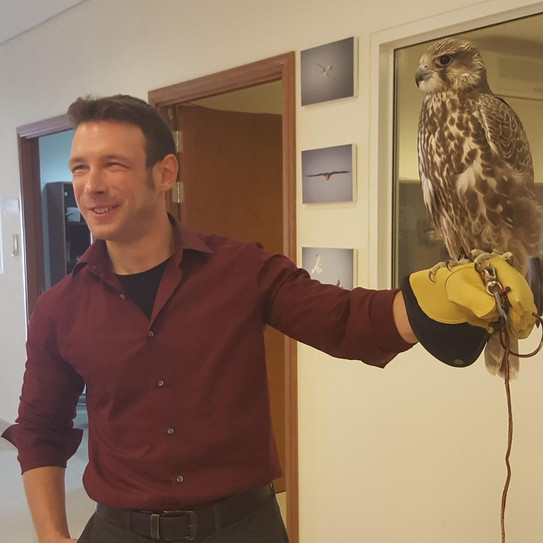Dr. Justin Wilcox

I am a molecular ecologist and evolutionary biologist with broad research interests at the intersections of community ecology and genomics. With a background in parasitology, microbial ecology, and avian genomics, my current research interests lie in exploring the role of internal genomic interactions on evolutionary processes. While we typically conceive of evolution in the context of selective forces on random mutations, we know that mutations occur in the context of extremely heterogenous genomic landscapes with potentially extreme local variability in the strength of these forces. Mutation and recombination rates can vary by more than an order of magnitude across a genome and influence both the types of novelty that arise and the chances of this novelty persisting. Birds possess high levels of evolutionary diversity and the most heterogenous genomes of vertebrates making them excellent candidates for studies on genomic architecture and evolution.
As model organisms in evolutionary and ecological processes, great tits (Parus major) are natural candidates for such research. My work with Prof. Toni Goßmann in the Computational and Systems Biology Group focuses on the role of Cytosine methylation and CpG mutations in adaptation in great tits. These epigenetic anchors are reliant on and give rise to the extreme heterogeneity in avian genomic landscapes, and through methylation can exert major impacts on selectable phenotypes. My research aims to elucidate the evolutionary importance of these genomics features through the application of state-of-the-art sequencing technologies.
Dr. Nikolas Vellnow

I am an evolutionary biologist interested in the evolution of reproductive traits and genome evolution in general. After studying the evolution of reproductive morphology and behavior from an organismal perspective for a while, I am now using bioinformatics tools to study genome evolution in the Computational Systems Biology research group. Recently, I started studying the following question:
-
How can genomic variation be measured and what can these measures tell us about the evolutionary history of the study organisms?
At the moment, I am trying to answer the question:
-
How can we modify standard genomics pipelines to study symbionts, parasites, and pathogens of a study organism in its natural habitat?
For this, I explore genomic data from Great Tits (Parus major), that we sample from a nest box population in a forest close to the campus of the Bielefeld University. I conduct this research as a Bachelor Thesis project under the supervision of Prof Toni Gossmann and Dr. Quentin Foucault in collaboration with Nayden Chakarov (https://www.uni-bielefeld.de/fakultaeten/biologie/forschung/arbeitsgruppen/behaviour/team/hosts-parasites/).
Dr. Quentin Foucault

I am a molecular ecologist primarily interested in combining population genomics and ecological investigation to unravel and study the mechanisms that shaped the biodiversity.
My current research focuses on the evolution of methylation pattern during different stages of embryogenesis in avian species, especially on species possessing an additional germinal chromosome (GRC) absent from the somatic cells. I am investigating the impact of those germlines’ methylation patterns on the development of birds and the possible evolutive implications, using DNA seq, RNA seq and Proteomics analyses on various GRC and non GRC bird species. The focus organism of my research is the great tit (Parus major), bringing embriogenic epigenome study to natural populations. This permits to open the way to investigations on how the environment is shaping the epignome during embryogenesis with the use of natural field populations sampled every years since 2018 and a semi-urban field population newly set-up.
Dr. Sahar Javaheri Tehrani

As a biologist with a passion for the natural world, particularly birds, I have dedicated my academic pursuits to understanding and unraveling the complexities of avian biodiversity. My research interests are to explore the origin of great tit color phenotypes, and possible genome-wide consequences of ecology-driven selection. My educational journey led me to Ferdowsi University of Mashhad, where I completed both my master and Ph.D. in animal biosystematics. During my master’s program, I focused on the study of bird biodiversity in northeastern Iran, utilizing the CO1 barcoding gene. This experience laid the foundation for my doctoral project, which centered on the taxonomic study of great tit (Parus major) using molecular markers. In my Ph.D. project, I endeavored to shed light on the evolutionary relationships within this complex species.


